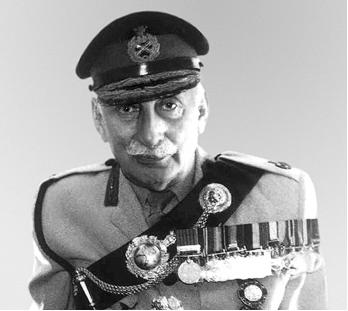
Sometimes a country has men serve them better than perhaps they deserve. Often, some leave a life of unique experience. One of those men left us recently.
Take some time to honor a rare man; Field Marshal Sam Manekshaw, Indian Army.
HIS most famous remark was not, strictly speaking, true. On the eve of the war with Pakistan in December 1971 that led to the creation of Bangladesh, India’s prime minister, Indira Gandhi, asked her army chief, Sam Hormusji Framji Jamshedji Manekshaw, if he was ready for the fight. He replied with the gallantry, flirtatiousness and sheer cheek for which he was famous: “I am always ready, sweetie.” (He said he could not bring himself to call Mrs Gandhi “Madame”, because it reminded him of a bawdy-house.)A bit flippant. However, you think you have equipment challenges?
And of his armoured division’s 189 tanks, only 11 were fit to fight.A lion with a bit of a cheeky-monkey he was.
He was not, in other words, ready. But, as he put it, “There is a very thin line between being dismissed and becoming a field-marshal.” Mrs Gandhi rejected the resignation he offered, and acceded to the delay he wanted. His job, he told her, was to fight to win. In December he did, cutting through the Pakistani army like a knife through butter, and taking Dhaka within two weeks.
He had shown this in the Indian army’s darkest hour, the abject defeat in 1962 by China. Already a general, he had the previous year quarrelled with India’s defence minister, V.K. Krishna Menon, about national security. He was vindicated when the Chinese army swatted aside Indian resistance and briefly occupied what is now the state of Arunachal Pradesh. Mr Menon resigned. General Manekshaw was rushed to the front to rally the demoralised troops. His first order was: “There will be no withdrawal without written orders and these orders shall never be issued.”I wanted to take time to honor him for the same reason The Economist did; his own nation didn't.
General Manekshaw was able to demand courage from his soldiers because his own was not in doubt. Known as Sam “Bahadur”, or Sam the Brave, an honorific given him by the Indian army’s Gurkhas, the first of his five wars was for the British in Burma, where he was seriously wounded. Assuming he would die, an English general pinned his own Military Cross on Captain Manekshaw’s chest, since the medal could not be awarded posthumously. Another story has it that a surgeon was going to give up on his bullet-riddled body, until he asked him what had happened and got the reply, “I was kicked by a donkey.” A joker at such a time, the surgeon reckoned, had a chance.
The prime minister, along with the army, navy, and air-force chiefs, all missed his funeral—which was a modest one held in Tamil Nadu in the south, not a grand one in the capital. His friends grumbled that even foreigners such as Lord Mountbatten were afforded greater respect in death. Bangladesh, however, paid grateful tribute to his part in the nation’s foundation.Rest in peace Field Marshal.
He too might well have been disappointed that his obsequies were not grander. His last words were “I’m OK”, though he had rehearsed a better line nearly 37 years earlier. For death at least, the brave soldier had indeed shown himself “always ready.”









No comments:
Post a Comment